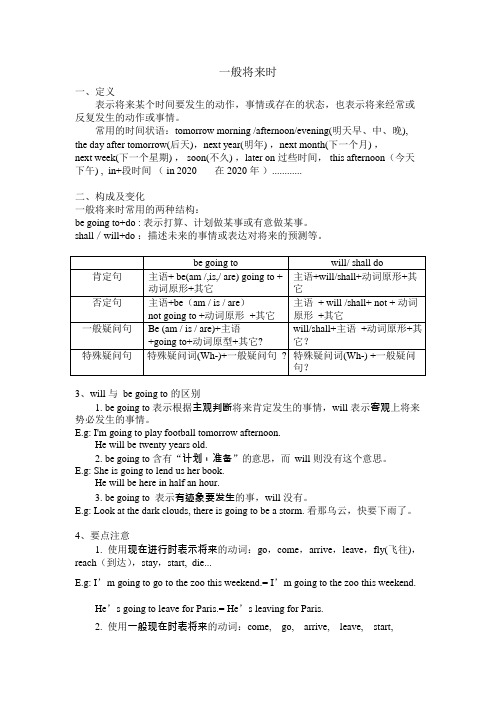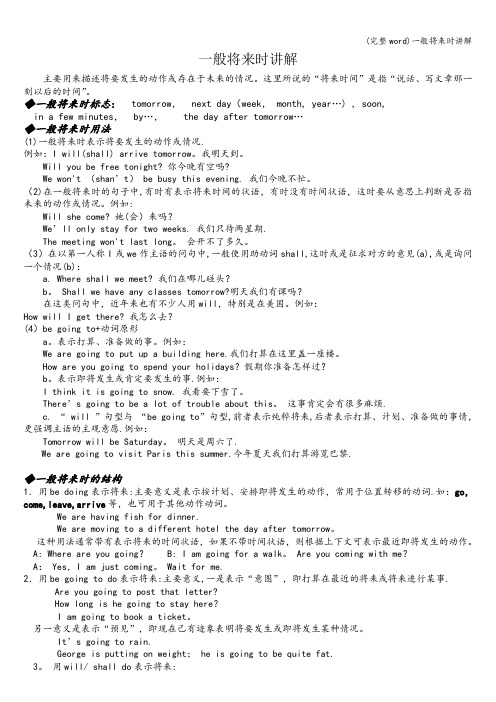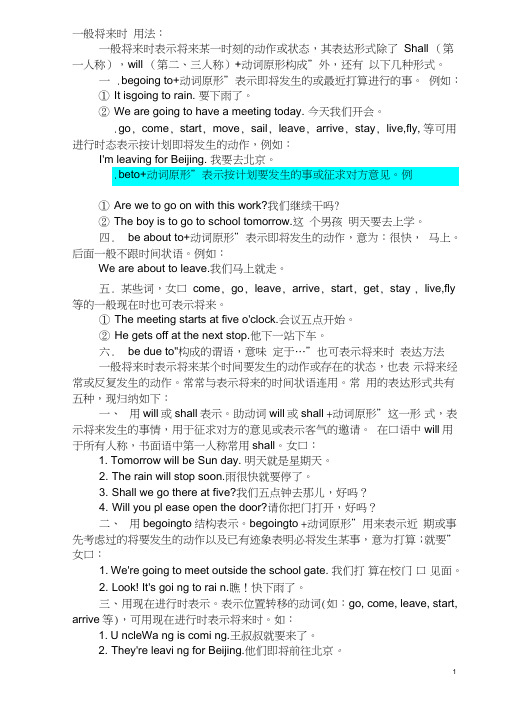(完整word版)初一下英语一般将来时
一般将来时(完整版)

一般将来时(完整版)文章已经没有格式错误和明显有问题的段落了,但是可以对每段话进行小幅度的改写:一、单项选择一般将来时1.他们问我明天他什么时候来,我不知道。
他到达时我会立刻给你打电话。
答案:B解析:第一句为宾语从句,从句用一般现在时态;第二句为条件状语从句,从句用一般现在时态代替将来时态,主句用一般将来时态。
2.中国当前的环境状况越来越糟糕,如果我们现在不采取行动来保护环境,我们将会后悔。
答案:C解析:if引导的条件状语从句,从句用一般现在时态代替将来时态,主句用一般将来时态。
3.明天下午三点你有空吗?不,那时我将会在听一个报告。
答案:D解析:答句表示未来某个时间点正在进行的动作,用将来进行时态。
4.帮我在厨房里忙一下,我请你喝杯咖啡。
好的,听起来不错。
答案:A解析:主句用一般将来时态,表示将来会发生的动作;动词___用一般将来时态,表示将来会请客。
1.“If you help me in the kitchen。
I will treat you to a cup of coffee,” sounds good。
(改写:The sentence “If you help me in the kitchen。
I will treat you to a cup of coffee,” ___.)2.Only when one es a parent does one realize how great their own parents are。
(改写:ing a parent is the only way to truly ___.)3.It’s time for me to go home。
but I’m enjoying myself。
so I will stay here a bit longer。
(改写:Although it’s time for me togo home。
I’m having a good time。
(完整版word)英语一般将来时知识点(大全)含答案

(完整版word)英语一般将来时知识点(大全)含答案一、初中英语一般将来时1.—Have you watched the new movie Kung Fu Panda 3, Kelly?—Not yet. I________it with my classmate tonight.A. will watchB. was watchingC. have watched【答案】 A【解析】【分析】句意:---你看了新电影《功夫熊猫3》了吗,凯利?---还没有,我今天晚上和同学去看。
A是一般将来时;B是过去进行时;C是现在完成时。
由not yet可知此处动作尚未发生,可排除BC;另外tonight是将来时间,所以用一般将来时。
故答案为A。
【点评】考查动词的时态,注意上下文的暗示词。
2.-- Tommy, do you know if they _____ to the zoo this Sunday if it _____?-- Sorry, I have no idea.A. will go; is fineB. go; is fineC. will go; is going to be fineD. go; will be fine【答案】 A【解析】【分析】句意:——Tommy,你知道这个星期天如果晴天他们是否去动物园吗?——对不起,我不知道。
第一个空前的if引导宾语从句,意思是“是否”,根据从句的tomorrow可知用一般将来时;第二个空前的if引导条件状语从句,意思是“如果”,从句中用一般现在时表示将来,故选A。
【点评】考查动词的时态。
3.—Do you know ______?—The day after tomorrow.A. when we visited the museumB. when we will visit the museumC. when did we visit the museumD. when will we visit the museum【答案】 B【解析】【分析】句意:——你知道我们什么时候参过博物馆吗?——后天。
外研版英语七年级一般将来时(可编辑修改word版)

一般将来时一、定义表示将来某个时间要发生的动作,事情或存在的状态,也表示将来经常或反复发生的动作或事情。
常用的时间状语:tomorrow morning /afternoon/evening(明天早、中、晚), the day after tomorrow(后天),next year(明年) ,next month(下一个月) ,next week(下一个星期) ,soon(不久) ,later on 过些时间,this afternoon(今天下午) , in+段时间(in 2020 在2020 年)............二、构成及变化一般将来时常用的两种结构:be going to+do : 表示打算、计划做某事或有意做某事。
shall/will+do :描述未来的事情或表达对将来的预测等。
3、will 与be going to 的区别1.be going to 表示根据主观判断将来肯定发生的事情,will 表示客观上将来势必发生的事情。
E.g: I'm going to play football tomorrow afternoon.He will be twenty years old.2.be going to 含有“计划,准备”的意思,而will 则没有这个意思。
E.g: She is going to lend us her book.He will be here in half an hour.3.be going to 表示有迹象要发生的事,will 没有。
E.g: Look at the dark clouds, there is going to be a storm. 看那乌云,快要下雨了。
4、要点注意1.使用现在进行时表示将来的动词:go,come,arrive,leave,fly(飞往),reach(到达),stay,start, die...E.g: I’m going to go to the zoo this weekend.= I’m going to the zoo this weekend.He’s going to leave for Paris.= He’s leaving for Paris.2.使用一般现在时表将来的动词:come, go, arrive, leave, start,begin, return...表示在时间上已确定或安排好的事情。
(word完整版)初一下英语一般将来时

第三讲:一般将来时段时间内经常的动作或状态。
一、定义:一般将来时表示将来某一时刻的动作或状态,或将来某1. 表示将来某一时刻的动作或状态:e.g. She will buy a new bike tomorrow. We will drive to thepark next week. I shall visit my gra ndpare nts this weekend. They are going to play computer games this evening. Iam going to have a big meal.2. 将来某一段时间内经常的动作或状态:e.g. He is gong to have a big house n ext year .She will have a daughter.The cat will have a master.The dog will have a house.二、常与一般将来时连用的词1.时间状语系列:next Tuesdayn ext weekn ext yearthe coming Sun daythis after noontomorrowtoni ghtin a few mi nutesin the futurein five years fromnow on 厂soon三、一般将来时的构成1. wil /shall的一般将来时构成:主语+ will/shall + 动词原形+其它I will/shall go to Beiji ng next week. 语是第一人称时——shall主语为任何人称时——will否定句的构成:主语+ will/shall not +动词原形+其它will not =won 'sha[not=shan '【活学活用】按照要求改写句子1、My teacher will teach us next term.(改为否定句)2、I shall not buy new clothes this month.(改为肯定句)3、She is playing computer games.( 改为将来时)4、We shan't take part in the football match.( 改为肯定句)5、I visit my grandparents every weekend.(( 改为将来时)2. be going to 的一般将来时构成:主语+ be goingto + 动词原形+ 其他She is goingto play basketballthis afternoon.主语是” I ”时am主语为单数时is主语为复数及you 时 -- are否定句的构成: 主语+ be not going to + 动词原形+ 其他She is not going to play basketball this afternoon.is not = isn 't am not = ' m not are not = aren 'twill 或shall 与be going to 区别:1. will 或shall 用法总结:1) 表示一个将来的动作或状态,“要…,会…”She will go to the park tomorrow.2) 表示不以人的意志为转移的自然发展的事。
(完整版word)七年级英语句型及语法(英语一般将来时)及解析

(完整版word)七年级英语句型及语法(英语一般将来时)及解析一、初中英语一般将来时1.— Excuse me. Could you tell me ?— It will leave at 4:00 p.m.A. how will you go to ShanghaiB. how you will go to ShanghaiC. when the bus would leave for ShanghaiD. when the bus will leave for Shanghai【答案】 D【解析】【分析】这是一道根据回答写出问句所缺成分的题目,阅题时要仔细分析回答的句子。
句意:打扰一下,你能告诉我这辆公交车什么时候动身前往上海吗?它将会在下午4点的时候离开。
据回答知问句问的是时间,故排除A和B。
由题知,句子是一般将来时,故问句中也要用一般将来时态。
故选D。
【点评】本题需要考生根据回答反推问题,在阅题时要仔细审题。
2.-- Tommy, do you know if they _____ to the zoo this Sunday if it _____?-- Sorry, I have no idea.A. will go; is fineB. go; is fineC. will go; is going to be fineD. go; will be fine【答案】 A【解析】【分析】句意:——Tommy,你知道这个星期天如果晴天他们是否去动物园吗?——对不起,我不知道。
第一个空前的if引导宾语从句,意思是“是否”,根据从句的tomorrow可知用一般将来时;第二个空前的if引导条件状语从句,意思是“如果”,从句中用一般现在时表示将来,故选A。
【点评】考查动词的时态。
3.Hold your dream,_____ you might regret some day.A. andB. orC. butD. so【答案】 B【解析】【分析】考查连词.句意:坚持你的梦想,___有一天你会后悔的。
(完整word)一般将来时讲解

一般将来时讲解主要用来描述将要发生的动作或存在于未来的情况。
这里所说的“将来时间”是指“说话、写文章那一刻以后的时间”。
◆一般将来时标志: tomorrow, next day(week,month, year…) , soon,in a few minutes,by…, the day after tomorrow…◆一般将来时用法(1)一般将来时表示将要发生的动作或情况.例如:I will(shall) arrive tomorrow。
我明天到。
Will you be free tonight? 你今晚有空吗?We won't (shan’t) be busy this evening. 我们今晚不忙。
(2)在一般将来时的句子中,有时有表示将来时间的状语,有时没有时间状语,这时要从意思上判断是否指未来的动作或情况。
例如:Will she come? 她(会)来吗?We’ll only stay for two weeks. 我们只待两星期.The meeting won't last long。
会开不了多久。
(3)在以第一人称I或we作主语的问句中,一般使用助动词shall,这时或是征求对方的意见(a),或是询问一个情况(b):a. Where shall we meet? 我们在哪儿碰头?b。
Shall we have any classes tomorrow?明天我们有课吗?在这类问句中,近年来也有不少人用will,特别是在美国。
例如:How will I get there? 我怎么去?(4)be going to+动词原形a。
表示打算、准备做的事。
例如:We are going to put up a building here.我们打算在这里盖一座楼。
How are you going to spend your holidays?假期你准备怎样过?b。
表示即将发生或肯定要发生的事.例如:I think it is going to snow. 我看要下雪了。
(完整word版)一般将来时练习题及答案学习

一般将来时用法:一般将来时表示将来某一时刻的动作或状态,其表达形式除了Shall (第一人称),will (第二、三人称)+动词原形构成”外,还有以下几种形式。
一 .begoing to+动词原形”表示即将发生的或最近打算进行的事。
例如:①It isgoing to rain. 要下雨了。
②We are going to have a meeting today. 今天我们开会。
.go, come, start, move, sail, leave, arrive, stay, live,fly, 等可用进行时态表示按计划即将发生的动作,例如:①Are we to go on with this work?我们继续干吗?②The boy is to go to school tomorrow.这个男孩明天要去上学。
四.be about to+动词原形”表示即将发生的动作,意为:很快,马上。
后面一般不跟时间状语。
例如:We are about to leave.我们马上就走。
五.某些词,女口come, go, leave, arrive, start, get, stay , live,fly 等的一般现在时也可表示将来。
①The meeting starts at five o'clock.会议五点开始。
②He gets off at the next stop.他下一站下车。
六.be due to"构成的谓语,意味定于…”也可表示将来时表达方法一般将来时表示将来某个时间要发生的动作或存在的状态,也表示将来经常或反复发生的动作。
常常与表示将来的时间状语连用。
常用的表达形式共有五种,现归纳如下:一、用will或shall表示。
助动词will或shall +动词原形”这一形式,表示将来发生的事情,用于征求对方的意见或表示客气的邀请。
在口语中will用于所有人称,书面语中第一人称常用shall。
(完整版)初中英语语法一般将来时态

与一般将来时连用的时间状语
tomorrow 明天 the day after tomorrow 后天 soon 很快
this year 今年 next week 下周 in the future 将来
in three days 三天后
in ten minutes 在一般将来时 中用IN 表示在多久以后
What are they going to do this evening? They are going to watch TV.
What is the bear going to do tomorrow?
It is going to cook dinner.
What are they going to do ?
There will be only one country. 否定句:在will后面加not.
There won’t be only one country. 一般疑问句:把will提到there之前。
Will there be only one country? Yes, there will. / No, there won’t.
一般将来时的主要用法:
1、表示将来某一时刻的动作或状态: We will come to see you the day after tomorrow. There will be a wonderful show next week.
2、表示将来某一段时间内经常的动作或状态: The students will come and work in the lab once a
They will do heavy work.
They won`t do Will they do heavy work. heavy work?
- 1、下载文档前请自行甄别文档内容的完整性,平台不提供额外的编辑、内容补充、找答案等附加服务。
- 2、"仅部分预览"的文档,不可在线预览部分如存在完整性等问题,可反馈申请退款(可完整预览的文档不适用该条件!)。
- 3、如文档侵犯您的权益,请联系客服反馈,我们会尽快为您处理(人工客服工作时间:9:00-18:30)。
第三讲:一般将来时一、定义:一般将来时表示将来某一时刻的动作或状态,或将来某一段时间内经常的动作或状态。
1.表示将来某一时刻的动作或状态:e.g. She will buy a new bike tomorrow.We will drive to the park next week.I shall visit my grandparents this weekend.They are going to play computer games this evening.I am going to have a big meal.2.将来某一段时间内经常的动作或状态:e.g. He is gong to have a big house next year .She will have a daughter.The cat will have a master.The dog will have a house.二、常与一般将来时连用的词:1. 时间状语系列:next Tuesdaynext weeknext yearthe coming Sundaythis afternoontomorrowtonightin a few minutesin the futurein five yearsfrom now onsoon三、一般将来时的构成1. will/shall的一般将来时构成:主语 + will/shall + 动词原形+其它I will/shall go to Beijing next week.主语是第一人称时 ----- shall主语为任何人称时 ----- will否定句的构成: 主语 + will/shall not + 动词原形+其它will not = won’tshall not= shan’t【活学活用】按照要求改写句子1、My teacher will teach us next term.(改为否定句)___________________________________________2、I shall not buy new clothes this month.(改为肯定句)___________________________________________3、She is playing computer games.(改为将来时)___________________________________________4、We shan't take part in the football match.(改为肯定句)___________________________________________5、I visit my grandparents every weekend.((改为将来时)___________________________________________2. be going to的一般将来时构成:主语+ be going to + 动词原形+ 其他She is going to play basketball this afternoon.主语是”I”时 ----- am主语为单数时 ----- is主语为复数及you时 ----- are否定句的构成: 主语 + be not going to + 动词原形+ 其他She is not going to play basketball this afternoon.is not = isn’tam not = ’m notare not = aren’twill或shall与be going to区别:1. will或shall用法总结:1)表示一个将来的动作或状态,“要…,会…”She will go to the park tomorrow.2)表示不以人的意志为转移的自然发展的事。
Tom will be 18 next year.Spring will come again.Tomorrow will be Sunday.3) will+v 有时表示说话是临时决定或打算。
--- My car won’t start.---Don’t worry, I will come and give it a push.2. be going to用法总结:1)用来表示按计划或安排要发生的动作,“准备;打算”。
这种主观意图,一般已做过事先安排,故其实现的可能性较大We are going to have a class meeting this afternoon.(安排)2)表示根据现有情况、某种迹象,判断将要或即将发生的动作。
此时不含有主观意图,只是表示说话人对客观事态发展的判断或推测Look at the black clouds. It's going to rain.Look, the tree is going to fall.【活学活用】填入适当的be动词。
1.She ______( be not) going to live in Beijing next year.2.My parents _______(be not ) going to teach in this school.3. They _____(be) going to play computer games this evening.4. I ______(be) going to have a big meal.5. I______going?to?go?there?next?month.6. He____going?to?visit?his?grandparents?next?year.7. They?______ going?to?find?a?new?house?to?live?in.8. He?______(be not) going?to?see?the?movie.?9. You?_____(be not) ?going?to?work?on?the?farm?this?weekend.10. We?______(be not)?going?to?have?a?meeting?this?afternoon.3. 一般疑问句含will/shall的一般疑问句Will he go therewill/shall 主语动词原形其它Yes,he will. No,she won’t.will/shall+主语+动词原形+其它肯定回答:Yes,主语+will/shall否定回答:No,主语+will/shall+not注意:在回答时,主语要用相应的代词代替含will/shall一般疑问句的改写秘诀:一调二改三问号;一调:即把句中的will/shall调到主语前;二改:改换主语称谓,即将句中的主语I my mine we our ours等第一人称分别改为相应的第二人称you your yours等;三问号:句末的句号改为问号含be going to的一般疑问句Is he going to play basketball therebe动词主语going to 动词原形其它Yes,he is. No,she isn’t.Be动词+主语+going to+动词原形+其它肯定回答:Yes,主语+be否定回答:No,主语+be+not注意:在回答时,主语要用相应的代词代替含be going to一般疑问句的改写秘诀:一调二改三问号;一调:即把句中的be调到主语前;二改:改换主语称谓,即将句中的主语I my mine we our ours等第一人称分别改为相应的第二人称you your yours等;三问号:句末的句号改为问号【活学活用】将下列句子改为一般疑问句并做肯定和否定回答1.I am?going?to?have?a?party?tomorrow.?__________________________________________________________________________________2.He is?going?to?write?to?his?friends.__________________________________________________________________________________3. They are?going?to?buy?a?new?car.__________________________________________________________________________________4. I will have many presents.__________________________________________________________________________________5.They will do heavy work.__________________________________________________________________________________6.There will be a computer in it.__________________________________________________________________________________4. 特殊疑问句以疑问词开头,对句中某一成分提问的句子叫特殊疑问句。
常用的疑问词有:what who whose which when where how why等。
其语序是:疑问词+一般疑问句语序如:What?are?you?going?to?have?tomorrow?What?are?you?going?to?do?tonight?How will you go there?What shall we do next?特殊疑问词+will/shall+主语+动词原形+其他eg:Where will you go?特殊疑问词+be动词+主语+going to+动词原形+其它eg:What is your mum going to do this weekend?注意:回答特殊疑问句时,不能用yes /no,即问什么答什么,尤其是简略回答。
如:Who is going to visit us?Helen (is).Where will we go to visit?Beijiao Park.【活学活用】一、选择正确的单词填空(可以多选)(who, where, which, why, when, how )1.______ will you do next?2.2. ______ will you do this job?3.3. ______ are you going to shop?4.4. ______are you going ?5.5. ______ will he come back?6.6. ______country will Tom choose?7.7. ______ shall Ido?8.8. ______ will your parents go to work tomorrow?9.9. ______ are you going to Beijing?10.10. ______ will she stay next week?二、就画线部分提问1. They will eat at 12:00._________________________________________________2.She is going to swim in the sea._________________________________________________3. She will swim in the sea._________________________________________________4. Daming is going to drink a Cola._________________________________________________5. Daming is going to drink a Cola._________________________________________________6.Alex is going to play basketball with me this afternoon._________________________________________________7.We will get up early tomorrow morning._________________________________________________8.There will be an English test next Thursday._________________________________________________9.We are going to watch the football game._________________________________________________10.We are going to watch the football game._________________________________________________5.其它的时态代将来的的情况:A. 用现在进行时表示。
